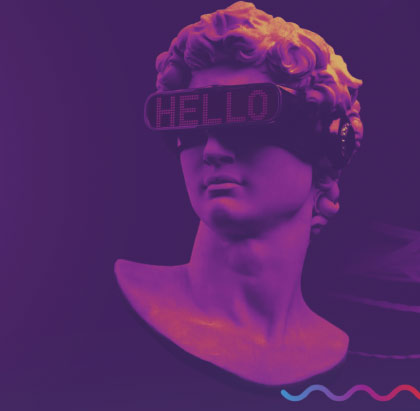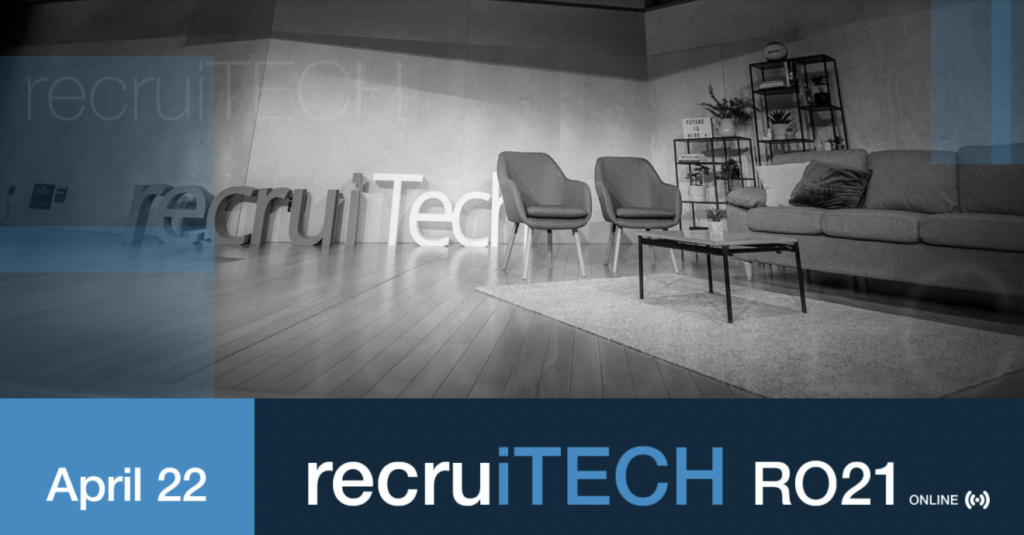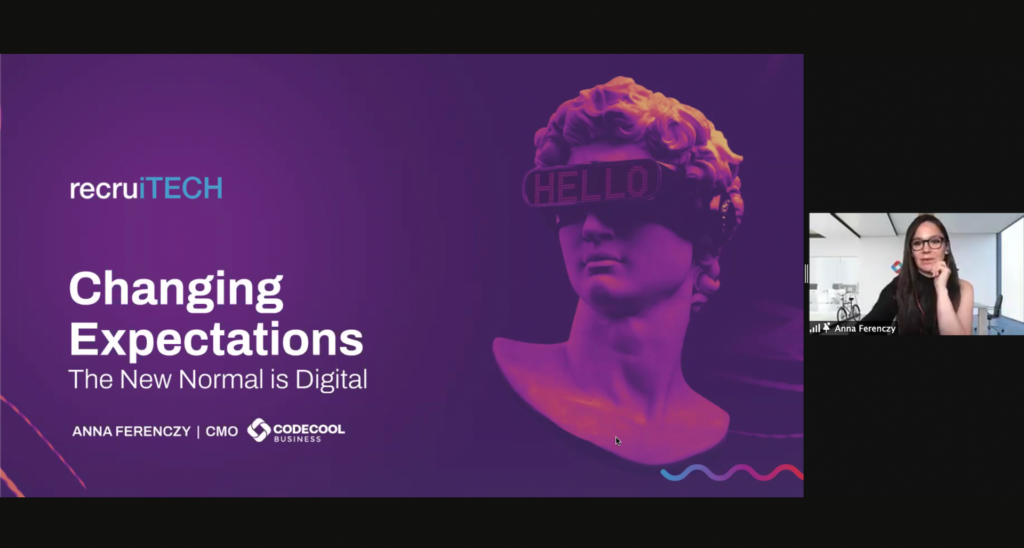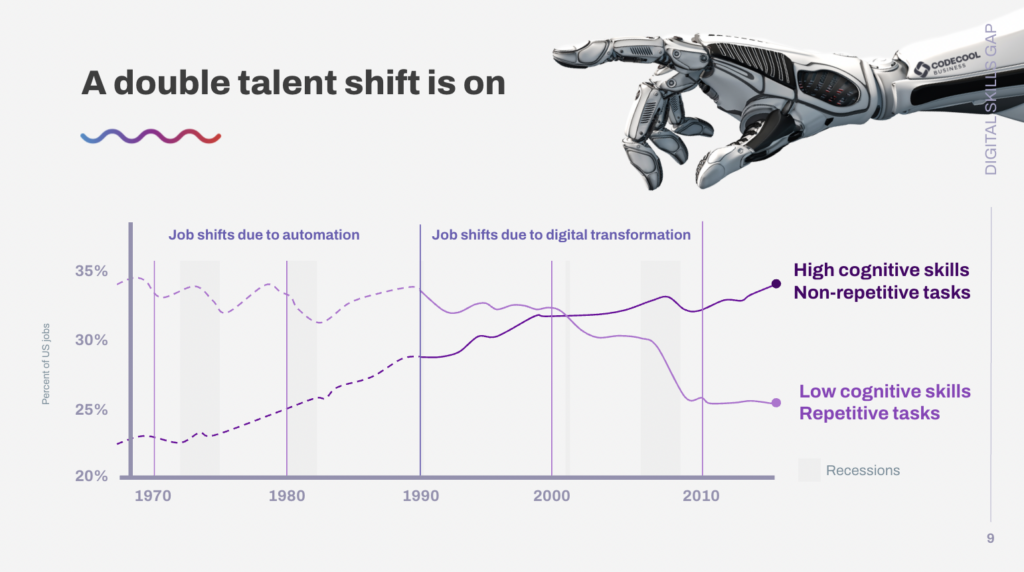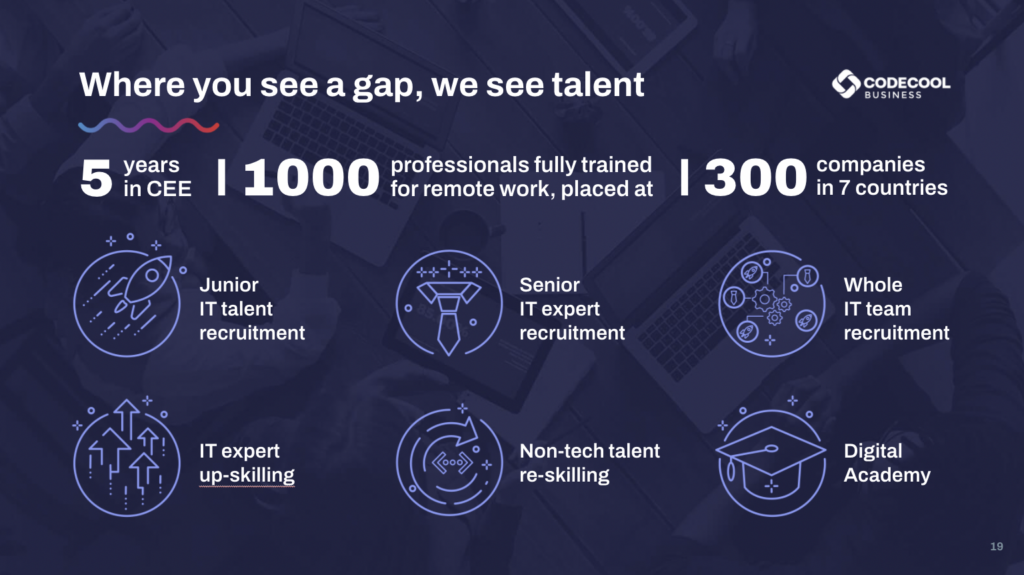
A team of Codecoolers developed an innovative learning support app, that might change the lives of children with a chronic desease.
Morgan Stanley and the Amigos for Children Foundation asked young developers to help non-profits building innovative learning tools for children and teenagers with chronic diseases, in the scope of a three-month virtual competition.
We’re super proud that the Codecooler team – Zsofia Szonja Kassai, Barnabas Urmossy, Balint Molnar and Kristof Murai – came 2nd place in the Hungarian competition, in an all-university team lineup.
We asked them about their experience at the hackaton and their studies at Codecool.
What motivated you to sign up for the Code to Give hackathon in the first place? Was this your first hackathon?
Zsofi: Yes, this was our first! We were curious about the challenge, we wanted to try ourselves and learn from a longer project. The idea that we might help a nonprofit was very attractive, too.
Barnabas: I wanted to know what it would be like to work together with a client on a project which is much longer than the usual 1-2 projects we are used to. Plus, I knew that we’re a really good team, and wanted to see us as a team develop, besides individual development.
Balint: For me, it was a no-brainer. I’ve never participated in anything similar, and I loved the concept that we can help kids learn languages, sponsored by a huge multinational company.
Kristof: I was also driven by curiosity in the first place. I had no idea what to expect. I wanted to see what we can do being in the 2nd part of our one-year full-stack development training. The idea that we can help kids in need was obviously a huge plus.
You named your team LazyLlamas. Where did this crazy name come from? 🙂
Barnabas: We realised that we shared an interest about llamas at our very first meeting. Then we just sat back like we had nothing else to do until we sign up. We added the “lazy” when we realised that we have just 15 minutes left until the deadline and we still haven’t registered the team in the competition, which was so us, actually.
But it felt good when people mentioned a few times, later, during the competition that based on the way we work we must have meant “lazy” as irony.
What kind of learning support tool have you developed? Can we see it?
Zsofi: Our app has 2 parts, one for students and one for teachers. The part for students is a learning enhancing tool with 6 types of tasks. The part for teacher, or the “Amigos” makes it easy to create tasks, monitor students’ progress and give feedback.
Barnabas: The basic idea was to create an app with templates that help creation of new tasks. And we also wanted to support the communication between the students and the Amigos, so that they can align on tasks and evaluation. On top of this, we wanted to create a gamified system for collecting points to enhance students’ motivation.
Balint: The biggest benefit of the app, just like Barna mentioned, are the templates. We created templates for memory game, word – image coupling, interpretation of written and spoken text, substitution and organisation into categories. We made all of them available on all the languages the Amigos work with.
Kristof: We’re very happy to demo the app to anyone who finds it interesting.
What was it like to participate? How did it feel to get in the finals?
Zsofi: For me it was an amazing experience! We spent the whole time sleeping much less, collecting creative ideas all the time, working together really smoothly as a team. Our original goal was to learn, but we’re so happy we got this far in our first hackaton. And it was super exciting to present our idea to the jury in the finals.
Barnabas: On top of what we have expected, the whole thing required a lot of organisation, project management, copywriting and presentation rehearsals. I really enjoyed being able to practise all this in a real-life development environment. And the experience helped me decide that I want to be a front-end developer after Codecool. Plus, getting into the final showed that we were capable of performing well in such a complex project, even before finishing course.
Balint: The competition was a blast and I was especially happy that I could refresh my web skills, plus learn CSS at the same time. I was really curious how we’ll perform among the university teams, but after the meetings of round2 it was obvious that we’d make it to the finals.
Kristof: I just loved everything about the competition. It was great to see what it takes to organise and put together an app from scratch. We started out super motivated and the ideas just kept coming to us. Then, after we successfully presented our ideas, our motivation got another boost, and then we just had to fight time to actually deliver on our idea. Getting into the finals felt like a dream come true, and assured us that we did a good job.
What was the biggest challenge in the competition?
Zsofi: Racing with time. We had so many ideas, but it was almost impossible to deliver on them in such short time.
Barnabas: In the last days I found it really difficult to let go of some of our ideas and my maximalism, just like Zsofi. We had to decide what to implement in the prototype and what to put on the next steps slide in the final presentation.
Balint: For me it was CSS! 😀 And as the project kept growing, refactoring. It was really challenging to create and put each task type together, but the end result turned out very organised, thanks to Zsofi.
Kristof: For me, too, the biggest challenge was time, because we just kept getting newer ideas about how to make each task type even better and fancier. We had to draw the line somewhere eventually.
What skills could you use in the competition that you got at Codecool?
Zsofi: Like everything. 🙂
Barnabas: There were 1 or 2 technical solutions that were so specific that we haven’t seen anything similar during the course. But since we also learnt at Codecool how to find new solutions on the internet, we managed to find and apply those, too.
Balint: We had a huge advantage in the finals because we pracised so much already at the Friday demoes in front of clients at Codecool. As for hard skills, for me the hackaton was like “and add-on” to the web modul of the full-stack course. Our app turned out a Flask based, JavaScript-heavy website, with a complex database structure.
Kristof: I got all my coding and developing skills from Codecool, so I used what I learnt there. And when I got stuck, I could always turn to a Codecool mentor for help.
Where are you now in your Codecool studies? What are you learning about now?
Zsofi: We’re at the end of the OOP (Object-Oriented Programming) module, which is the 3rd or the 4 modules of the one-year full-stack development course. We signed up for the hackathon at the beginning of this module.
Barnabas: Yeah, the competition lasted the whole time of the module. Let me take the opportunity to send our thanks to our teammates who put extra effort into our shared Codecool projects, so we could focus on this challenge. 🙂
Balint: It was refreshing to work on something totally different while also coding in Java (but obviously the last weeks of OOP were also about web based stuff, databases and such). I’m actually just about to start my last module, I’ll specialise in Test Automation.
What are your plans for after Codecool?
Barnabas: I will start looking at web app front-end developer jobs with real confidence after this competition.
Balint: Precision planning is far from me, I have always been going with the flow. I’m curios about the Test Automation specialisation at the moment.
Kristof: I liked the web modul best so far and especially after this result I’m looking forward to become a web developer, too.
What will you do with with your prize? You’ve got some EMAG vouchers.
Zsofi: I haven’t decided yet. I want to make good use of it.
Balint: I killed my laptop a few months ago, so I got a new one from my prize.
Kristof: I have always wanted a smart watch, but I’ve never came around investing in it. Now I have.
What is the biggest learning for you from the competition? Is there anything your would do differently in retrospect? Would you ever enter a hackathon again?
Zsofi: The biggest learning for me, how much I actually learnt during the ride. I’m satisfied with our performance and would definitely go for another hackathon, too, sometime.
Barnabas: In the beginning I haven’t even realised how big of a task we took on. It even started to get a little scary after a while. But seeing that we can do all this, I started to come up with new ideas and challenges in the last days. I would definitely do something like this again.
Balint: i would do a lot of things differently, for example I would stick to naming conventions form the very beginning, and make SCRUM standups regular. But we all did our best, and I would definitely do this again.
Kristof: Since this was my first hackathon, I would do many things differently. But it was an amazing experience and I would definitely be up for the challenge again.
Inspired by this success story? Want to work with juniors like these amazing Codecoolers?
Our fresh graduates are waiting. Reach out and let’s discuss how we can help you.
We can’t wait to talk to you!


